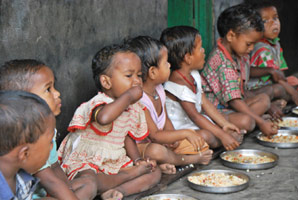Our Works
CRECHE FOR CHILDREN

Mothers who go to work in the field or elsewhere for the whole day, can leave their children (till the age of 3 years) here, between 7 in the morning and 4 in the evening. The children are fed, bathed, provided with basic education and good habit formation. Basic health-care services are also provided following the Homeopathic method. The children undergo health checkup at two month intervals. There are two dedicated teachers and two helpers to take care of these children. Most of these children hail from tribal families who are invariably agrarian workers and the parents are almost always devoid of basic education. Around 30 children can be accommodated in this crèche.
SOCIAL SERVICES CENTER
As a part of their policy and vision, SikshaNiketan maintains close ties with people from the neighbouring villages and tries to serve the community in many ways. This includes health advice, health check up and even organizing eye operations etc. The other way in which SikshaNiketan involves the locals is by encouraging the more privileged people to contribute either a fistful of rice or One Rupee everyday. This donation is collected by people of SikshaNiketan and the idea is to bridge the disparity in income to whatever possible extent. Since many women with grown up children have some free time at their disposal, SikshaNiketan organizes free training in tailoring, embroidery etc. to them to enable them to earn some money.
ORGANIC FARMING

SikshaNiketan has undertaken the task of reintroducing the traditional seeds in paddy cultivation in collaboration with BidhanchnadraKrishiViswavidyalaya (Agricultural University). First they grew these varieties over 3-4 seasons and demonstrated the viability. Now, they are cultivating 31 varieties of traditional rice they are distributing free seeds to the local farmers with a condition that they return twice that amount of seeds at the end of their cultivation. In this process, within a short span of three years, about 200 farmers are now cultivating these varieties which fetch much higher prices for their yields even in the local market, compared to the hybrid seeds they used earlier. A part of this cultivation, along with vegetable, is being done in two separate plots, where no chemical fertilizer or pesticide is used. Only home-grown, organic fertilizers and pesticides are being used. Today, the produce from these two plots are certified as `organic’ by IMO, Bangalore.
OLD AGE HOME
SikshaNiketan runs an Old Age Home, which can accommodate upto 32 inmates. Situated in between the crèche and the nursery school for 3-6 year olds, this home will offer an ideal opportunity for close interaction and exchanges between the inmates and the children that is beneficial for both.